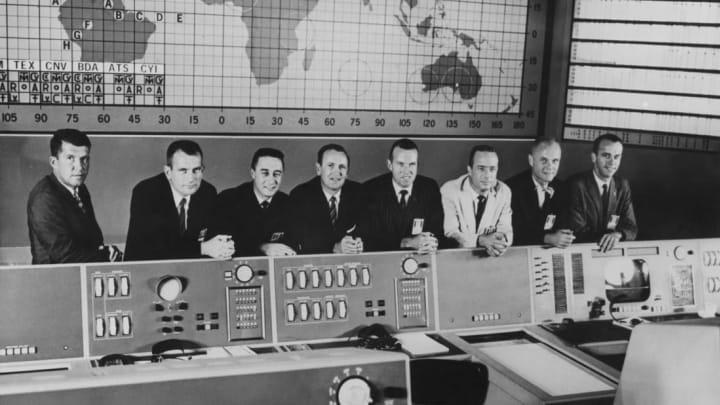In 1958, NASA launched Project Mercury, its first manned space program. To have a manned space program, of course, it had to have astronauts. The men who would take part in the six Mercury flights were the first of their kind—in fact, the project even introduced the word "astronaut" as the term for American space explorers.
How did NASA choose the men for the team? Through a rigorous battery of tests, according to Popular Science, that measured their physical, psychological, and intellectual fitness for the job. The magazine recently recreated a small subset of those tests that you can take to see just how fit you might have been for the project.
The five tests Popular Science excerpts are only a fraction of what finalists had to endure. Out of 508 military pilots initially screened for inclusion, NASA hoped to find six astronauts who were the healthiest, smartest, most committed, and most psychologically stable men they could locate. After months of testing, they had such a hard time narrowing it down that they ended up choosing seven instead. Here’s how NASA describes just a small sliver of the process:
In addition to pressure suit tests, acceleration tests, vibration tests, heat tests, and loud noise tests, each candidate had to prove his physical endurance on treadmills, tilt tables, with his feet in ice water, and by blowing up balloons until exhausted. Continuous psychiatric interviews, the necessity of living with two psychologists throughout the week, and extensive self-examination through a battery of 13 psychological tests for personality and motivation, and another dozen different tests on intellectual functions and special aptitudes—these were all part of the week of truth.
In the end, seven were left: Alan Shepard, John Glenn, Gus Grissom, Scott Carpenter, Gordon Cooper, Wally Schirra, and Deke Slayton. Could you have been one of them? Well, you may not be able to test out your endurance in a pressure suit, but you can take a few of the psychological tests, including ones on spatial visualization, mechanical comprehension, hidden figures, progressive matrices, and analogies.
To test your skills, head over to our pals at Popular Science.
